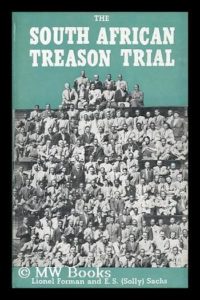
*On this date in 1956, the South Africa Treason trial began. This Treason Trial was a prosecution in Johannesburg in which 156 primarily Black citizens were arrested in a raid and accused of treason in South Africa.
On December 5 of that year, the South African Police's Security Branch raided and arrested 140 people from around the country on the charge of treason as they enforced the Suppression of Communism Act. Those not based in Johannesburg were flown in military aircraft and held in custody until a hearing. The raids were follow-ups to those conducted in 1955 and included search warrants to look for documents at 48 anti-government organizations. On December 19, 1956, 153 prisoners were driven to the Johannesburg Drill Hall for a preliminary hearing to examine the state's evidence.
Magistrate Frederick Wessels was the presiding judge, with J.C. van Niekerk as the state's public prosecutor. An attempt by the prosecutor to proceed with the case was interrupted three times as the noise of 5,000 black South Africans, hoping to attend the case, surrounded the streets of the Drill Hall and sang Nkosi Sikeleli Afrika. The proceedings had to be halted. The Labor Party in the UK accused the South African Government of intimidating and victimizing those opposed to Apartheid, condemning the trial, and calling South Africa a police state.
Chief Luthuli said of the Treason Trial: The treason trial must occupy a special place in South African history. That grim pre-dawn raid, deliberately calculated to strike terror into hesitant minds and impress upon the entire nation the determination of the governing clique to stifle all opposition, made one hundred and fifty-six of us, belonging to all the races of our land, into a group of accused facing one of the most serious charges in any legal system.
The primary trial lasted until 1961, when all the defendants were not guilty. During the trials, Oliver Tambo left the country and was exiled. He started an organization in other European and African countries that helped bring publicity to the African National Congress's cause in South Africa. Some of the defendants were later convicted in the Rivonia Trial in 1964.